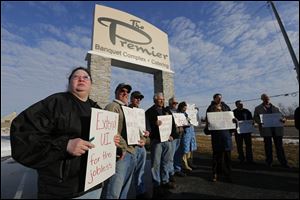
COMMENTARY
Restore aid to jobless — and help them get work
3/23/2014
Kushma

Demonstrators attend an appearance by Ohio Sen. Rob Portman at the Lucas County Republican Party’s Lincoln Day dinner this month in Toledo.

Kushma
Three months ago, Congress failed to renew extended unemployment benefits for nearly 2 million Americans who had been out of work for more than six months. That shameful default has aggravated economic hardships for 52,000 jobless Ohioans, their families, their communities, and their counterparts nationwide among the long-term unemployed.

Portman
A bipartisan proposal before the Senate could end the impasse — for two months, anyway. Ohio’s senators, Republican Rob Portman and Democrat Sherrod Brown, are cosponsors of the compromise legislation, which would restore the federal safety-net benefits retroactive to their cutoff and extend them through May, while talks continue on broader reforms to the unemployment insurance system.
That’s assuming the Senate approves the measure promptly; a vote could come as soon as this week. And it’s also assuming House Republicans finally suspend their bash-the-jobless crusade and go along: Last week, House Speaker John Boehner of Ohio said he opposed the Senate compromise, citing bureaucratic objections from state work-force agencies.
Senator Portman isn’t giving up.
“We’ve got a troubling number of Americans disconnected from the work force,” Mr. Portman told me last week. “Labor participation rates among men are the lowest since the 1940s. When people are out [of work] long enough, employers are hesitant to hire them.
“We need to do more than provide a check,” he says. “It’s much more important to help the long-term unemployed get a job. That’s my reason for getting involved in this.”
No one was living the high life on the extended benefits. They kicked in once jobless workers exhausted their 26 weeks of state-paid unemployment insurance, funded by taxes on employers to which workers contribute. In Ohio, the federal benefits lasted as long as 37 weeks and paid an average of $318 a week.
People used these benefits to escape poverty and homelessness while they continued to look for work in a still-tough economy, instead of, say, seeking permanent disability compensation from Social Security. They didn’t hoard the payments; they spent the aid immediately on necessities in their communities, preserving and creating local jobs.
Yet detractors continue to insist that the extended benefits discouraged large numbers of workers from looking for and taking jobs. That argument has been based more on political slogans than objective evidence.
The Senate compromise would pay for the roughly $10 billion in jobless benefits, without adding to the federal deficit, by extending customs user fees and making “smoothing” adjustments to private pension funding rules that are intended to increase tax revenue without weakening pension plans. As a sop to symbolism, the measure ensures that millionaires can’t collect jobless benefits — cutting the rolls by 3 recipients out of every 10,000.
More substantively, the proposal includes provisions aimed at helping long-term jobless workers get the credentials and assessment services they need to return to work quickly. It also lays a foundation for broader reforms of federal job training programs, which are marred by duplication and inefficiency, Senator Portman says.
He notes that President Obama’s recent State of the Union message referred to the gap between American workers’ skills and employers’ needs — an issue the debate over unemployment reform could address. And despite Speaker Boehner’s dismissal of the Senate proposal, Mr. Portman says skeptical House Republicans may be more likely to accept a compromise on benefits that is “not just about extension, but about making the system work better.”
The senator says the federal unemployment system must do more to ensure that extended benefits go to people who are actively looking for work, and to encourage them to accept suitable, if not necessarily dream, jobs. Provided such reforms are constructive rather than punitive, these are reasonable goals.
“I’m intrigued by the opportunity to help get people better connected to the workplace,” says Mr. Portman, a former federal budget director. “If some of these reforms are put in place, I think there’s a commitment to work on additional reforms. Then we can hope the economy improves, so we won’t need long-term extensions.”
Election-year rhetoric is touting Ohio’s somewhat improved job climate. According to federal data, Ohio was second only to Texas in the number of jobs it added in February, about 16,700.
The state’s unemployment rate declined last month to 6.5 percent — the lowest in almost six years — and has dropped below the national rate of 6.7 percent. Even so, the liberal advocacy group Policy Matters Ohio notes that in the past year, Ohio jobs have risen by 1 percent, compared to 1.6 percent nationwide.
There are still three unemployed Americans for every vacant job. The average length of unemployment across the country exceeds nine months.
A heartbreaking new study concludes that only 11 percent of workers who are unemployed for more than six months will find new full-time jobs within a year, if ever. These 3.8 million Americans account for more than one-third of all jobless workers.
The improved jobs numbers in Ohio provide cold comfort to vulnerable folks who are still out of work, especially those who haven’t had a job for a long time. They need to be helped, not ignored or stigmatized.
The fact that it’s taken lawmakers this long to figure out how to do something as urgent as extending jobless benefits — and that others continue to obstruct that effort — confirms what you need to know about Washington these days. For now, let’s just hope that Congress gets the extension done, and then finds a way to keep it going for longer than two months.
David Kushma is editor of The Blade.
Contact him at: dkushma@theblade.com or on Twitter @dkushma1